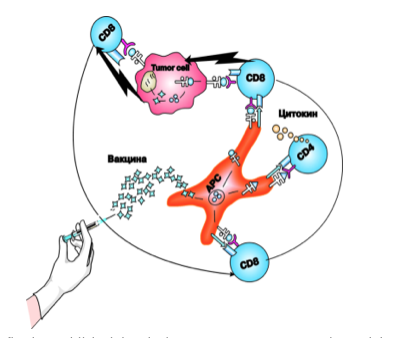
Cancer immunotherapy
It has been firmly established that the immune system can recognize and destroy single tumor cells and micrometastases, thus preventing disease development at the very onset. At the advanced disease stages, the immunotherapy is able to take control over tumor growth thereby inhibiting or halting tumor progression altogether (Figure 1).

Figure 1. The effects of traditional cytodestructive therapy and immunotherapy on tumor growth at the advanced disease stages.
Only by implicating all elements of antitumor defense, a stable antitumor effect can be achieved. To this end, an innovative antitumor extracorporeal immunotherapy has been developed to stimulate functional activity of all immune cells with antitumor potential with simultaneous inhibition of the functional activity of immunosuppressive cells. This technology can be effectively used both at early and advanced stages of various cancers.
Our treatment protocol includes three types of immunotherapy administered individually or in combination with each other.
1. Antitumor vaccination is specifically designed to break immune tolerance to tumor-associated antigens and induce antitumor immune responses. Differentiation antigens obtained from autologous tumors or their xenogeneic analogues can be used as an antigenic stimulus. Indeed, structural differences of xenogeneic antigens, as compared to their human analogs, have been shown to make them highly immunogenic, thus inducing immune responses in patients at both early and advanced disease stages, when the immune system bears a pronounced depressive burden of the tumorigenic process (reviews by Seledtsov et. Al., 2011, 2015).
2. Adoptive leukocyte immunotherapy is applied to stimulate antitumor cytotoxic activity of leukocytes ex vivo with subsequent introduction of activated leukocytes into the patient’s body. This technology allows to stimulate functional activity of all immune cells with antitumor activity (granulocytes, macrophages, NK cells, NKT cells, Th1 cells, CTLs, γδ T cells), as well as to inhibit the activity of cells that down-regulate antitumor immunity (Th2 cells, regulatory T cells, myeloid suppressor cells).
3. Drug-based immunotherapy is an essential part of anticancer therapy necessary to maintain antitumor activity of immune cells, as well as to reduce functional activity of immunosuppressive cells.
Diseases:
- Melanoma
- Renal cancer
- Colorectal cancer
- Gastric cancer
- Brain tumors
- Prostate cancer
- Lung cancer
- Breast cancer
- Thyroid carcinoma
- Ovarian carcinoma
- Pancreas cancer
Indications for immunotherapy:
- Early disease stages following surgical tumour excision if traditional systemic treatment is not indicated.
- Advanced disease stages if conventional systemic treatment alone is ineffective or not indicated.
Contraindications for immunotherapy:
- Severe anemia
- Multiple organ failure
- Narcotic analgesia.
Treatment
Benefits and advantages of antitumor immunotherapy:
- The ability to generate a long-lasting antitumor effect.
- Low invasiveness of the procedure and the absence of predicted serious side effects.
- Low invasiveness of treatment.
- Single blood sampling and the possibility of optimizing (personalizing) treatment regimen for each individual patient.
- The availability of multiple combination options with other therapeutic interventions.
